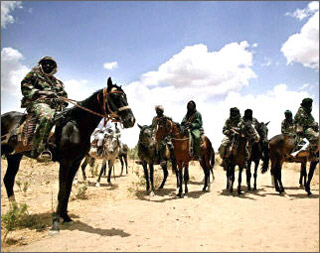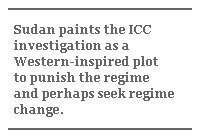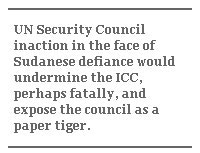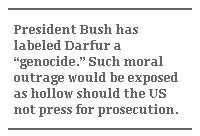Future of the World Court in Balance
Future of the World Court in Balance

militia, defies the International Criminal Court, will the UN stand up? (Photo: AFP)
Enlarge image
NEW YORK: The Sudanese government has responded swiftly to the call to hand over to the International Criminal Court two individuals allegedly responsible for atrocities in Darfur, delivering a blunt threat to “cut the throat of any international official…who tries to jail a Sudanese official in order to present him to the international justice.”
This is ultimately a challenge to the UN Security Council. How the international community responds to this defiance will determine the authority of the ICC and the Security Council itself.

On February 27, the ICC prosecutor named the targets of his investigation – former State Minister for the Interior Ahmad Harun and a janjaweed/militia commander, Ali Muhammad Ali Abd al-Rahman, also known as Ali Kushayb – and sought orders from ICC judges that they be brought to the Hague.
The vehement response by the Sudanese government indicates the regime’s awareness that the ICC threatens its legitimacy and perhaps its long-term survival. Harun is part of President Omer Al-Bashir’s inner circle, but not the most senior government figure responsible for the campaign of atrocities. Bashir, his special adviser Nafie Ali Nafie, and his national security chief Salah Gosh fear they may be future targets of Prosecutor Luis Moreno-Ocampo and hence the strident reaction.
Last week’s fireworks mark the most important developments in a case that has crept forward since the UN Security Council referred the situation in Darfur to the ICC in March 2005. The referral gave the ICC jurisdiction to investigate Khartoum’s systematic campaign of atrocities, one which has resulted in the death of more than 200,000 people and the displacement of some 2 million more over the last four years.

The referral itself was a landmark event, with the US, a strident opponent of the ICC, and China both abstaining on the vote. The Security Council called on Khartoum and other parties to the conflict in Darfur to “cooperate fully with and provide any necessary assistance to the Court and the Prosecutor pursuant to this resolution."
Bashir responded with defiance: “I shall never hand any Sudanese national to a foreign court." But Sudan’s strategy, more nuanced than its rhetoric over the last 18 months, has followed two tracks:
First, to curry support in the Islamic and developing worlds, Sudan has painted the ICC investigation as a Western-inspired plot to punish the regime and perhaps seek regime change.
Second, Sudan has argued that it is willing and able to deal with the crimes under investigation. If the government can satisfy the judges in The Hague that this is the case, then the ICC must defer to the Sudanese legal system. Thus, Bashir claims that the Sudanese judiciary is “honest and qualified to try any Sudanese" and has created the Special Criminal Court for Events in Darfur, which is currently conducting trials. It appears that Kushayb has been detained since November 2006 and Harun has been questioned by the Ministry of Justice. However, after examining these claims of competency and intent, the prosecutor nonetheless advised the court that Sudan is not investigating the same persons and conduct under ICC purview.
All evidence to date suggests that Khartoum will never hand Harun or Kushayb to the ICC if the judges make this order. Such a refusal would repudiate not only the ICC, but also the Security Council. Of course, defiance of the international community and international law is nothing new to this regime, which has repeatedly reneged on its commitments to disarm the janjaweed, implement ceasefires and allow the deployment of a more robust peacekeeping force, with no serious consequences.

If Khartoum remains defiant, the Security Council will be expected to enforce its ICC resolution. That would pose a dilemma for the Council: To date, it has shied away from implementing tough measures against Khartoum, preferring a policy of engagement to gain cooperation through peace negotiations, humanitarian relief efforts and plans to introduce a robust UN/African Union hybrid peacekeeping force.
Security Council inaction in the face of Sudanese defiance would undermine the ICC, perhaps fatally, and expose the council as a paper tiger. The Security Council is the ultimate guarantor of the ICC’s credibility, and failure to ensure compliance would encourage not just Sudan, but other governments whose officials are targeted by the ICC, to defy the court. By contrast, successful prosecutions in the Darfur case would reinforce the lessons of the Milosevic, Taylor and Habre cases, and force government officials to think carefully before embarking on state-sponsored atrocity campaigns.
Khartoum has also argued, with some outside support, that the ICC prosecutions are an obstacle to a peace deal with rebels and that the Sudanese government cannot be expected to negotiate while its ministers face the threat of indictment. But concerns about the interplay between the prosecutions and the peace process can be addressed through other avenues. The Rome Statute permits the Security Council to put prosecutions on hold for a 12-month period, renewable annually. In this case, there are few signs that Khartoum would use such a period to pursue peace, given the scale of its systematic atrocities, its past history of violating commitments and its bombing of proposed assembly areas for rebel leaders in advance of peace talks.
The Security Council must take a tough stance on Sudan’s non-compliance with the ICC. France and Britain, as prime movers of the ICC referral and strong supporters of the court, should lead the charge. The US should be supportive: President Bush has labeled Darfur “a genocide,” and despite a desire to maintain a counterterrorism relationship with the regime, the administration’s moral outrage over Darfur atrocities would be exposed as hollow should the US not press for prosecution for conduct so vehemently denounced. China, a long-time supporter of Sudan, has recently been tougher on the regime, fearing possible breakup of Sudan should the conflict continue. China is unlikely to veto a resolution in support of the ICC and expose itself to international condemnation before the 2008 Olympics. Russia will likely follow China’s lead.

The Security Council should provide Sudan a deadline for handing over the two individuals. Thus far, the failure of Khartoum to cooperate with the international community to resolve the conflict in Darfur has taken place at no cost to the regime. The council should change the calculations in Khartoum by imposing travel bans and asset freezes on the regime’s senior leadership, sanctioning the regime’s commercial entities, and considering measures specifically targeting revenue flows from the petroleum sector and foreign investment in that sector. Khartoum’s failure to accede to the council deadline should be enough to push even the most recalcitrant parties to support this approach.
The ICC prosecutor’s naming of Harun and Kushayb marks a milestone in the development of this fledging institution and a first step in a high-stakes test of international political will. How the Security Council responds to Sudan’s defiance will go a long way to determining whether the ICC will meet its founders’ expectations that it “put an end to impunity for the perpetrators of [atrocity crimes] and thus to contribute to the prevention of such crimes.” It will also determine whether anyone will be held accountable for the conscience-shocking atrocities in Darfur.
Nick Grono is vice-president for advocacy and operations at the International Crisis Group and former chief of staff to the Australian attorney general. Donald Steinberg is vice-president for multilateral affairs at the International Crisis Group and formerly US ambassador to Angola and NSC senior director for African Affairs.